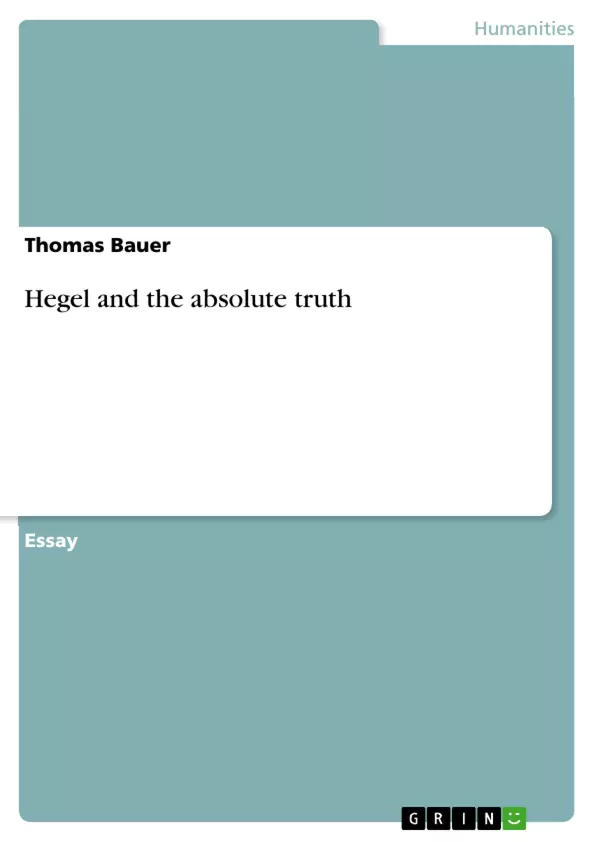“Quid est veritas?” It was not a philosopher who asked this important question. Pontius Pilatus, a roman prefect inquired one of the most important questions in philosophy. For Plato, a sentence is true if it says from whom it exists, that it exists. After Aristotle something becomes true not because we are thinking about it, we are thinking about it because it is true. For Augustine truth is, “quod ita est, ut videtur“(De vera relig. 36). The truth is eternal, timeless, non versatile and absolute. In the Scholastic, philosophers defined the truth as: adaequatio rerum et intellectuum. In the summa contra gentiles (I, 59.), Thomas Aquinas tells us : ”Veritas intellectus est adaequatio intellectus et rei, secundum quod intellectus dicit esse quod est, vel non esse quod non est.” For Descartes, the eternal truths of the mathematicians are given us by God, the truths are timeless and absolute but they can not exist outside our thoughts: “Aeternas veritates - nullam existentiam extra cogitationem nostram habentes” (Pr.ph. I, 48). Leibnitz tells us that the truth exists out of correspondence between the propositions with the things. The truth for Kant is a correspondence among the thoughts which correspond with the regulars of the mind. The eternal truth is turned into an a priority judgment. Now, we can not talk anymore of adaequatio rerum et intellectum, because the thing in itself can not be perceived anymore. Kant drew out the limits of our mind and because of this we can not have a knowledge of the absolute truth. Goethe now gives us a relative point of view: everyone can have his own truth: “Kenne ich mein Verhältnis zu mir selbst und zur Außenwelt, so heiße ich's Wahrheit. Und so kann jeder seine eigene Wahrheit haben, und es ist doch immer dieselbige“( WW. XIX, 53). Since Kant, the knowledge of the absolute truth is not available anymore, but there is a well known Philosopher, who wants to teach us that we can have a knowledge of the absolute truth. For Georg Wilhelm Friedrich Hegel, to seek the truth, to come to a knowledge of the absolute truth is the duty of a philosopher. In his first lecture at the University of Berlin, Hegel laments: “So ist das, was von jeher für das Schmählichste und Unwürdigste gegolten hat, der Erkenntnis der Wahrheit entsagen, vor unsern Zeiten zum höchsten Triumphe des Geistes erhoben worden.“
In this essay, I will try to show why Hegel believes that we can have knowledge of the absolute truth.
Inhaltsverzeichnis (Table of Contents)
- A: Introduction: Quid est veritas? – a short review
- B: The knowledge of the absolute truth
- I. What means "absolute knowledge"?
- II. How can we know the absolute?
- C: Critical discuss of Hegel's knowledge of the absolute
- D: Conclusion
Zielsetzung und Themenschwerpunkte (Objectives and Key Themes)
The essay aims to critically discuss why Hegel believes we can have knowledge of the absolute truth. It explores the concept of absolute knowledge, its relationship to theoretical and speculative knowledge, and how this knowledge emerges through the process of self-reflection.
- The meaning of absolute knowledge in Hegel's philosophy.
- The distinction between theoretical and speculative knowledge.
- The role of self-reflection in attaining absolute knowledge.
- Hegel's critique of previous philosophical perspectives on truth.
- The significance of the concept of "absolute" in relation to knowledge.
Zusammenfassung der Kapitel (Chapter Summaries)
- A: Introduction: Quid est veritas? - a short review: This chapter provides a brief overview of historical perspectives on truth, from Plato to Kant. It highlights the various definitions and interpretations of truth offered by different philosophers, ultimately setting the stage for Hegel's unique approach to the concept.
- B: The knowledge of the absolute truth: This chapter delves into the meaning of "absolute knowledge" according to Hegel. It explores the nature of this type of knowledge and distinguishes it from theoretical knowledge. The chapter emphasizes the speculative nature of absolute knowledge and its connection to the concept of the "Wesen," which represents the foundation of all existence.
Schlüsselwörter (Keywords)
The core concepts of the text include absolute knowledge, speculative knowledge, self-reflection, the Wesen, truth, and Hegel's philosophy. The essay examines the nature of knowledge, particularly the possibility of achieving absolute knowledge through a process of self-awareness and reflection.
Frequently Asked Questions
What is Hegel's view on "Absolute Truth"?
Hegel believes that seeking and knowing the absolute truth is the primary duty of a philosopher. He challenges the post-Kantian idea that absolute knowledge is inaccessible to the human mind.
How does Hegel distinguish between theoretical and speculative knowledge?
Theoretical knowledge often deals with objects as separate from the mind, while speculative knowledge involves the self-reflection of the spirit (Geist) recognizing itself in the object, leading to absolute knowledge.
Why did Kant believe we cannot know the absolute truth?
Kant argued that our mind is limited to perceiving appearances (phenomena) and cannot reach the "thing in itself" (noumenon), thus setting boundaries that Hegel sought to overcome.
What role does self-reflection play in Hegel's philosophy?
Self-reflection is the mechanism through which the mind transcends relative truths to reach the absolute. It is the process of the spirit becoming aware of its own foundation and unity.
What does "Quid est veritas?" refer to in this context?
It is the famous question asked by Pontius Pilate, used as a starting point to review how philosophers from Plato to Goethe have defined truth before arriving at Hegel's synthesis.
- Citar trabajo
- Thomas Bauer (Autor), 2005, Hegel and the absolute truth, Múnich, GRIN Verlag, https://www.grin.com/document/66093



